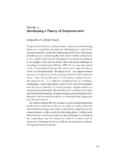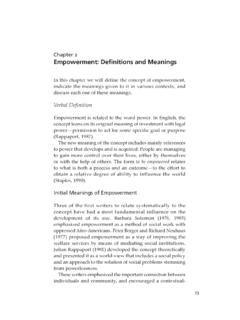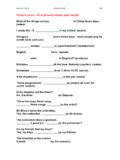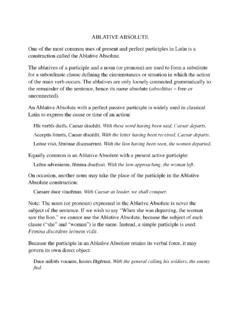Transcription of Chapter 1 Theories of Power - mpow.org
1 Empowerment and Community Planning Chapter 1. Theories of Power A Survey Towards the Development of a Theory of Power Before beginning the discussion of empowerment and the development of a theory connected with it, I want to deal with a concept that is prior to empowerment Power . Power is a key concept for an understanding of processes of empowerment. The theory of empowerment that will be developed further on will draw its inspiration from an integration of two domains: from an understanding of Theories of Power and the use of insights drawn from these for the purposes of developing a theory of empowerment, and from an analysis of processes of empowerment. Hence, this deeper study of it will also make possible a better understanding of states of powerlessness, practices of disempowerment, and processes by which people and communities struggle for control over their lives and environments.
2 A Brief History of Theories of Power This Chapter makes no pretension to survey all the existing literature in the field of the Theories of Power . It begins with a historical survey of thought about Power in the social sciences, relating only to the most prominent Theories . Further on, a number of Theories that contain elements suitable to the development of a theory of empowerment are presented in more detail. Modern thinking about Power begins in the writings of Nicoll Machiavelli (The Prince, early 16th century). and Thomas Hobbes (Leviathan, mid-17th century). Their books are considered classics of political writing, and the 32 33. Empowerment and Community Planning Chapter 1: Theories of Power the unpredictable character of the Power game, and its contrast between them represents the two main routes along profound dependence on context (Clegg, 1989).2. which thought about Power has continued to this day (Clegg, After the Second World War, the social sciences began taking 1989).
3 Machiavelli represents the strategic and decentralized an understandable interest in Power . At that time, the work of thinking about Power and organization. He sees Power as Max Weber (1947) served as a point of departure for thought a means, not a resource, and seeks strategic advantages, about Power because it continued the rational Hobbesian line such as military ones, between his prince and others. and developed organizational thinking. Weber's approach to Hobbes represents the causal thinking about Power as a Power connected with his interest in bureaucracy, and linked hegemony. Power , in Hobbes, is centralized and focused on Power with concepts of authority and rule. He defined Power sovereignty. as the probability that an actor within a social relationship According to Hobbes' basic premise, there exists a total would be in a position to carry out his will despite resistance political community, the embodiment of which is the state, or to it.
4 The activation of Power is dependent on a person's will, the community, or the society. This is a single unit, ordered even in opposition to someone else's. according to a uniform principle, possessing a continuity of Weber was interested in Power as a factor of domination, time and place, from which the Power stems. According to based on economic or authoritarian interests. He historically Machiavelli, total Power is a desirable final end, which is researched the sources of the formal authority that activates achieved only rarely. legitimate Power , and identified three sources of legitimation, In the mid-twentieth century it appeared that Hobbes' or accordance of social permission, for the activation of Power : view was triumphant. 1 His language and his images, written the charismatic, the traditional, and the rational-legal. more than a century after the publication of The Prince, Theories of Power after Weber developed in the direction were more appropriate to the modern scientific approach of investigation of illegitimate Power , as this grows within than Machiavelli's military images.
5 The central tradition of the formal and legitimate frameworks of hierarchic and research in the social sciences sought precision and logic bureaucratic Power , and in the direction of the critique of (and is still seeking them today), and it asks how one can Weber 's bureaucratic model (Merton, 1957). The critique observe, measure, and quantify Power . Power was presented of Weber stemmed, unjustly, from an understanding of his as a position of will, as a supreme factor to which the wills of theory as an idealization of the bureaucratic organization. others are subject. In the seventies, Machiavelli's strategic and The truth is that Weber saw the organizational Power of contingent approach attained to a renewed appreciation in the bureaucracy as the source of the mechanization and France, with the crystallization of approaches that rediscovered routinization of human life, and as a threat to the freedom of the human spirit.
6 He also predicted that this organizational form, as a Power instrument, would sabotage the appearance 1 Interest in Power exists in a variety of fields of thought: Karl Marx influenced the conceptualization of Power in all the social sciences;. Alfred Adler, following Marx, opened a discussion on Power in 2 Stuart Clegg's book Frameworks of Power (1989) has been of great psychology; Friedrich Nietzsche influenced thought about Power in assistance in helping me to understand the history of sociological philosophy. The present Chapter , however, focuses on contemporary writing about Power , and he is one of the sources for my writing of theorists for whom Power is the central concept in their thinking. the present Chapter . 34 35. Empowerment and Community Planning Chapter 1: Theories of Power of more democratic forms of organization (Morgan, 1986, Power conflicts do not rise above the public face of Power 1997).
7 Which is confined to certain values, rituals or beliefs that tend Robert Dahl (1961) continues Weber 's approach, both to favor the vested interests of one (or more) group/s relative in the definition of Power and in the attribution of it to a to others (Clegg, 1989). concrete human factor. Whereas Weber discussed Power in In the seventies, Steven Lukes (1974) developed Bachrach the context of the organization and its structures, Dahl located and Baratz's approach further. It was he who shifted the the discussion of Power within the boundaries of an actual discussion from community Power to a focus on Power as such, community. However, the major importance of Dahl is in the by introducing a three-dimensional model into the discussion development of the interest in understanding ruling lites, of the subject. The third dimension that Lukes added to the which came to the fore after the Second World War (Mills, discussion of Power , which theoretically already recognized 1956; Hunter, 1953).
8 According to his theory of community two dimensions the overt and the covert dimensions was Power , Power is exercised in a community by a particular the latent dimension of Power . While the overt dimension of concrete individual, while other individuals, also actual, Power deals with declared political preferences, as they reveal are prevented from doing what they prefer to do. Power is themselves in open political play, and the covert dimension exercised in order to cause those who are subject to it to deals with political preferences that reveal themselves through follow the private preferences of those who possess the Power . complaints about political non-issues, the third dimension Power is the production of obedience to the preferences of deals with the relations between political preferences and others, including an expansion of the preferences of those real interests. Power , according to Lukes, is measured also subject to it so as to include those preferences.
9 To this day, by the ability to implant in people's minds interests that are most writers dealing with organizational behavior make contrary to their own good. The third, latent dimension is the do with Dahl's definition of Power Power as the ability hardest of all to identify, because it is hard for people who to make somebody do something that otherwise he or she are themselves influenced by this dimension to discover its would not have done. existence. The analysis of Power , according to Lukes, must Peter Bachrach and Morton Baratz (1962) developed a model henceforth relate in addition to the open decisions (of as a response to Dahl the two faces of Power . This model is also Dahl's overt face) and the non-decisions (of Bachrach and a critique of Dahl's basic premises. Dahl assumed a pluralistic Baratz's covert face) also to the entire political agenda, in society, in which all the community interests are represented order to examine its adequacy to the true interests of various by means of open processes.
10 Bachrach and Baratz also have groups. (A more detailed explanation of the three dimensions a doubt as to whether the decision-making process is really of Power , and their development, appears in the section on democratic and open as Dahl assumed. They dealt mainly Gaventa's theory of Power .). with the connection between the overt face of Power the The writings of Michel Foucault (Foucault, 1979, 1980, way decisions are made and the other, covert face of Power , 1996) extended the discussion of the concept of Power from which is the ability to prevent decision making. They pointed sociology to all the fields of the social sciences and the to the strategy of mobilizing bias to prevent discussion on humanities. Through Foucault's influence, the empirical certain issues and thus to determine what is important and activity of identifying those who possess Power and of locating unimportant. They referred to this organizing of what stays Power loses its importance.






